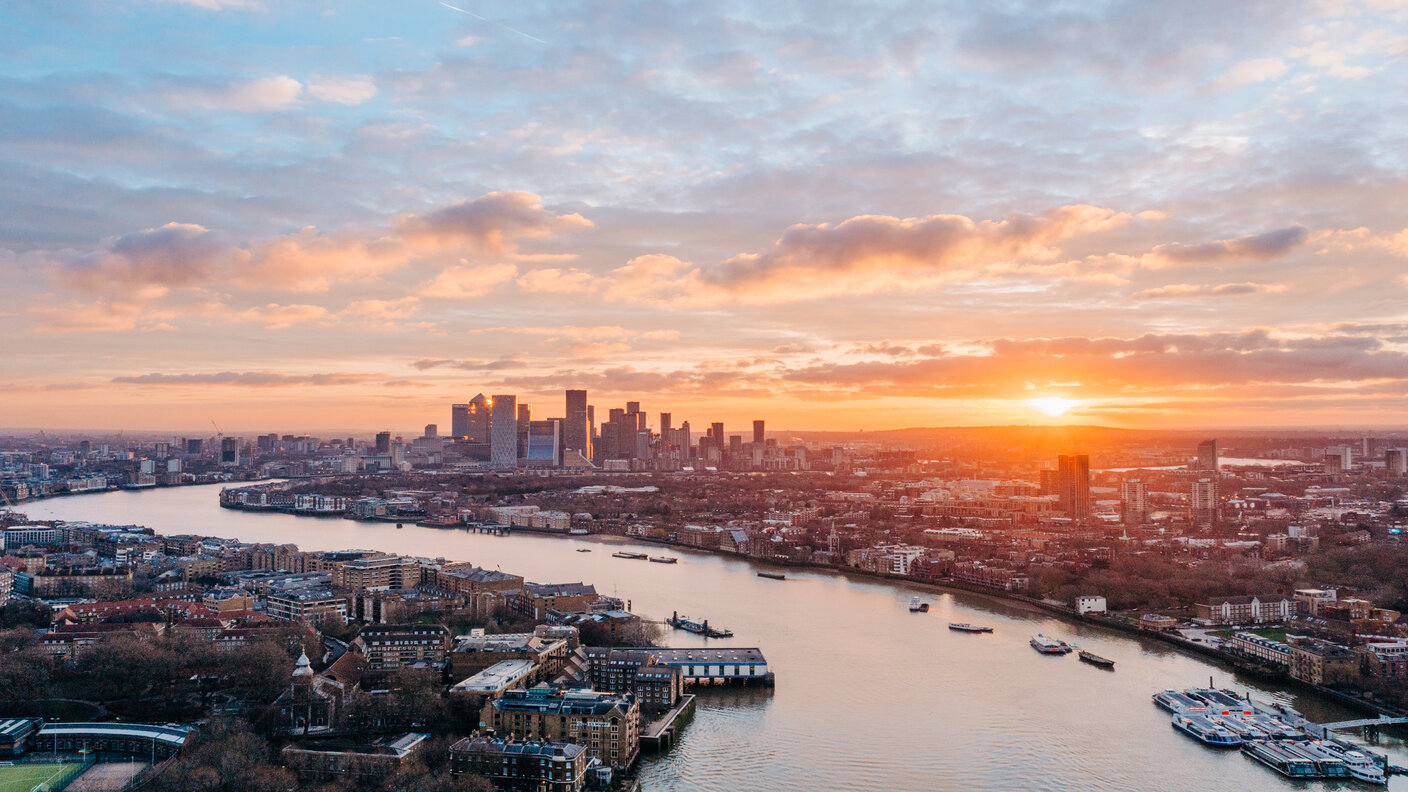It’s been 16 years, but the UK economy finally has a chance
The UK economy has been dealing with one crisis after another since 2007. Policymakers now have a chance to fix some of the underlying problems holding back growth.


Get the latest financial news, insights and expert analysis from our award-winning MoneyWeek team, to help you understand what really matters when it comes to your finances.
You are now subscribed
Your newsletter sign-up was successful
Want to add more newsletters?

Twice daily
MoneyWeek
Get the latest financial news, insights and expert analysis from our award-winning MoneyWeek team, to help you understand what really matters when it comes to your finances.

Four times a week
Look After My Bills
Sign up to our free money-saving newsletter, filled with the latest news and expert advice to help you find the best tips and deals for managing your bills. Start saving today!
It’s pretty hard to find any reason to be positive about the outlook for the UK economy. It’s plagued by high inflation, falling real wages, low capital investment, low productivity, staff shortages, high taxes, geopolitical uncertainty and high energy prices. That’s without mentioning the complete lack of a long-term economic growth strategy.
However, the outlook is becoming increasingly positive, as for the first time since 2006, policymakers have some breathing room to deal with the core fundamental issues hurting growth.
A series of economic crises
The UK economy has been hamstrung by a series of rolling crises effectively since 2007 when the pre-financial crisis boom years started to come to an end.
MoneyWeek
Subscribe to MoneyWeek today and get your first six magazine issues absolutely FREE

Sign up to Money Morning
Don't miss the latest investment and personal finances news, market analysis, plus money-saving tips with our free twice-daily newsletter
Don't miss the latest investment and personal finances news, market analysis, plus money-saving tips with our free twice-daily newsletter
The UK was disproportionately affected by the financial crisis due to its large financial sector. It sucked money and confidence out of the economy and left deep scars, some of which are still present to this day.
But before the UK economy could recover, the European debt crisis in 2010 roiled international markets once again. Then, in 2014, the Scottish independence referendum caused further uncertainty.
The economy barely had time to catch its breath before the Brexit saga began in 2016, ushering in another period of uncertainty. And just as it looked as if there might be a light at the end of the Brexit tunnel in 2019 with the arrival of Boris Johnson and his large parliamentary majority, the coronavirus pandemic arrived. Nearly two more years of chaos followed, capped off by Liz Truss’ disastrous premiership at the end of 2022.
Combined, the UK economy has faced 16 years of perpetual crisis, hammering business and consumer confidence while stopping policymakers from, well, making policy. Chancellors have been preoccupied with firefighting short-term issues, rather than dealing with the long-term structural problems holding back growth.
Many of the problems the economy faces today are rooted in this extended period of uncertainty and unpredictability.
But, we now have some form of stability and predictability for the first time since 2007. There is a degree of uncertainty over who will be in office at the end of 2024, but whether it be the Labour or Conservative party, both sides have made it clear they want to prioritise stability.
At the same time, as the recent banking crisis has shown, the UK financial sector has put its problems behind it. And over in Europe, the UK is having conversations with European partners that were unthinkable just 12 months ago.
In the past week, it has been announced that the UK and Netherlands are going to work to build a new electricity interconnector, one of the most powerful in the world, to share renewable energy from the North Sea. This was announced at a European-wide energy conference.
There have also been rumours that Rishi Sunak is looking to convince the EU to reduce the burden on UK travellers crossing the EU border. Reports say this is still in very early stages, but it’s indicative of the change in mood.
This increased cooperation is a direct result of the so-called Windsor framework, which seems to have put to bed (and seen off a rebellion from the Tory right) some of the major issues surrounding Brexit.
Progress for the UK economy at home and abroad
As well as improving international cooperation, the current government is also working to improve its relations with the business community here in the UK – a sharp change from Boris Johnson's economic legacy of “f**k business”.
Jeremy Hunt, the chancellor, was criticised for not unveiling any big tax cuts in his Spring Budget, but he did announce some interesting changes around business tax relief, particularly full expenses for capital investment, and some streamlining of the tax system, notably the level of the lifetime allowance, which has reportedly driven experienced employees out of the workforce.
We’ve also seen Rishi Sunak present the broad outline of an industrial strategy, focused around science, technology, aerospace, and the creative industries.
These are not huge shifts, but they are the sort of small, reassuring changes the country has been lacking for the past two decades as policymakers have been dealing with fire after fire.
Despite these headwinds, the UK economy hasn’t done particularly badly compared to its European peers since the Brexit referendum. The economy has grown at roughly the same rate as Germany since 2016, according to figures for the Office for National Statistics (ONS).
Similar figures show business investment is up significantly since 2016. Meanwhile, the total employment rate (the percentage of people available for work in employment) of workers aged 16 to 64 has risen from around 70% at the beginning of 2012 to just under 76% at the end of February.
Stability is the base for growth
A stable policymaking environment should act as a launchpad for the business after nearly two decades of uncertainty.
Granted, I can’t claim there’s a clear runway ahead. Challenges such as high inflation, worker shortages, stringent planning rules and low levels of government investment will persist. Still, the government now has the time to deal with some of these issues head-on, and that’s a big positive.
On the inflation front, there’s already positive news. Wholesale energy prices, which affect everything from the price of bread to the heating bill for the NHS, have collapsed since the highs of last year. The UK wholesale gas price is now back to levels not seen since 2021. Food prices are also set to fall over the coming months according to the country’s largest food retailer Tesco.
No one can predict what the future holds for the UK economy, but for the first time in a long time, the foundations are in place to support a period of growth and recovery.
More from MoneyWeek:
- 6 natural gas stocks to buy to profit from the gas gold rush
- A tech stock to buy to cash in on the AI revolution
- 5 travel stocks to buy to cash in on the sector’s rebound
- Seize this opportunity to scoop up superior-quality growth stocks
- Share tips of the week
Get the latest financial news, insights and expert analysis from our award-winning MoneyWeek team, to help you understand what really matters when it comes to your finances.

Rupert is the former deputy digital editor of MoneyWeek. He's an active investor and has always been fascinated by the world of business and investing. His style has been heavily influenced by US investors Warren Buffett and Philip Carret. He is always looking for high-quality growth opportunities trading at a reasonable price, preferring cash generative businesses with strong balance sheets over blue-sky growth stocks.
Rupert has written for many UK and international publications including the Motley Fool, Gurufocus and ValueWalk, aimed at a range of readers; from the first timers to experienced high-net-worth individuals. Rupert has also founded and managed several businesses, including the New York-based hedge fund newsletter, Hidden Value Stocks. He has written over 20 ebooks and appeared as an expert commentator on the BBC World Service.
-
 Should you buy an active ETF?
Should you buy an active ETF?ETFs are often mischaracterised as passive products, but they can be a convenient way to add active management to your portfolio
-
 Power up your pension before 5 April – easy ways to save before the tax year end
Power up your pension before 5 April – easy ways to save before the tax year endWith the end of the tax year looming, pension savers currently have a window to review and maximise what’s going into their retirement funds – we look at how
-
 Was Margaret Thatcher great for Britain?
Was Margaret Thatcher great for Britain?The 'Iron Lady’ would be celebrating her 100th birthday this month. Margaret Thatcher rose to power in 1979 as the first ever female prime minister and was one of the most controversial leaders in history, but how did her policies shape today’s finances?
-
 UK wages grow at a record pace
UK wages grow at a record paceThe latest UK wages data will add pressure on the BoE to push interest rates even higher.
-
 Trapped in a time of zombie government
Trapped in a time of zombie governmentIt’s not just companies that are eking out an existence, says Max King. The state is in the twilight zone too.
-
 America is in deep denial over debt
America is in deep denial over debtThe downgrade in America’s credit rating was much criticised by the US government, says Alex Rankine. But was it a long time coming?
-
 UK economy avoids stagnation with surprise growth
UK economy avoids stagnation with surprise growthGross domestic product increased by 0.2% in the second quarter and by 0.5% in June
-
 Bank of England raises interest rates to 5.25%
Bank of England raises interest rates to 5.25%The Bank has hiked rates from 5% to 5.25%, marking the 14th increase in a row. We explain what it means for savers and homeowners - and whether more rate rises are on the horizon
-
 UK inflation remains at 8.7% ‒ what it means for your money
UK inflation remains at 8.7% ‒ what it means for your moneyInflation was unmoved at 8.7% in the 12 months to May. What does this ‘sticky’ rate of inflation mean for your money?
-
 Would a food price cap actually work?
Would a food price cap actually work?Analysis The government is discussing plans to cap the prices of essentials. But could this intervention do more harm than good?